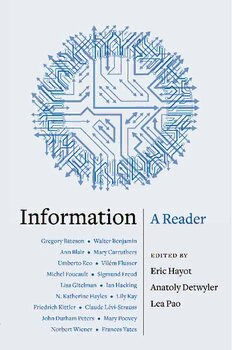
Information: A Reader PDF
Preview Information: A Reader
INFORMATION INFORMATION A Reader EDITED BY ERIC HAYOT, ANATOLY DETWYLER, LEA PAO Columbia University Press New York Columbia University Press Publishers Since 1893 New York Chichester, West Sussex cup.columbia.edu Copyright © 2022 Columbia University Press All rights reserved Library of Congress Cataloging-in-Publication Data Names: Hayot, Eric, 1972– editor. | Detwyler, Anatoly, editor. | Pao, Lea, editor. Title: Information : a reader / edited by Eric Hayot, Anatoly Detwyler, Lea Pao. Other titles: Information (Hayot, Detwyler, Pao) Description: New York : Columbia University Press, [2021] | Includes index. Identifiers: LCCN 2020030682 (print) | LCCN 2020030683 (ebook) | ISBN 9780231186209 (hardcover; acid-free paper) | ISBN 9780231186216 (trade paperback; acid-free paper) | ISBN 9780231546546 (ebook) Subjects: LCSH: Information science—Philosophy. | Information science— Social aspects. Classification: LCC Z665 .I582 2021 (print) | LCC Z665 (ebook) | DDC 020—dc23 LC record available at https://lccn.loc.gov/2020030682 LC ebook record available at https://lccn.loc.gov/2020030683 Columbia University Press books are printed on permanent and durable acid-free paper. Printed in the United States of America Cover design: Milenda Nan Ok Lee Cover art: sylverarts Vectors © Shutterstock CONTENTS An Introduction 1 THE SHANNON KNOT 15 1 Claude Shannon, from A Mathematical Theory of Communication (1948) 20 2 Norbert Wiener, from Cybernetics; or, Control and Communication in the Animal and the Machine (1948) 29 3 Harold Garfinkel, from Toward a Sociological Theory of Information (1952) 37 4 Donald MacKay, from “The Place of ‘Meaning’ in the Theory of Information” (1955) 41 5 Claude Shannon, “The Bandwagon” (1956) 51 6 Gregory Bateson, from “The Cybernetics of ‘Self’: A Theory of Alcoholism” (1972) 53 7 John Durham Peters, from “Information: Notes Toward a Critical History” (1988) 60 8 N. Katherine Hayles, from “Contesting for the Body of Information: The Macy Conferences on Cybernetics” (1999) 69 vi Contents 9 Peter Janich, from What Is Information? (2006) 76 10 Matthieu Triclot, from The Cybernetic Moment (2008) 82 ORDER, NUMBER 89 1 Michel Foucault, from The Order of Things: An Archaeology of the Human Sciences (1966) 93 2 Mary Poovey, from A History of the Modern Fact: Problems of Knowledge in the Sciences of Wealth and Society (1998) 105 3 Ian Hacking, from The Taming of Chance (1990) 113 4 Thomas Richards, from The Imperial Archive: Knowledge and the Fantasy of Empire (1994) 121 5 Friedrich Hayek, from “The Use of Knowledge in Society” (1945) 127 6 Claude Lévi-Strauss, from “The Mathematics of Man” (1954) 133 7 Lily Kay, from Who Wrote the Book of Life? A History of the Genetic Code (2000) 146 THE WORK OF ART 159 1 Martin Heidegger, from “The Origin of the Work of Art” (1950) 163 2 Walter Benjamin, from “The Storyteller: Reflections on the Works of Nikolai Leskov” (1936) 170 3 Yuri M. Lotman, “The Future for Structural Poetics” (1979) 177 4 Abraham Moles, from Information Theory and Esthetic Perception (1958) 185 5 Haroldo De Campos, from “The Informational Temperature of the Text” (1960) 194 6 Umberto Eco, from The Open Work (1962) 201 7 William R. Paulson, from The Noise of Culture: Literary Texts in a World of Information (1988) 209 MEDIA ECOLOGIES 215 1 Frances Yates, from The Art of Memory (1966) 219 2 Mary J. Carruthers, from “Ars oblivionalis, ars inveniendi: The Cherub Figure and the Arts of Memory” (2009) 226 Contents vii 3 Michael E. Hobart and Zachary S. Schiffman, from Information Ages: Literacy, Numeracy, and the Computer Revolution (1998) 235 4 Walter Ong, from Orality and Literacy: The Technologizing of the Word (1982) 242 5 Sigmund Freud, from “A Note Upon the ‘Mystic Writing-Pad’ ” (1925) 248 6 Vannevar Bush, from “As We May Think” (1945) 253 7 Marshall McLuhan, from Understanding Media: The Extensions of Man (1964) 260 8 Friedrich Kittler, from “There Is No Software” (1993) 265 9 Vilém Flusser, from Form and Material (1993) and Recoding (1987) 271 10 Lisa Gitelman, from Paper Knowledge: Toward a Media History of Documents (2014) 279 INFORMED SOCIETY 285 1 James Beniger, from The Control Revolution: Technological and Economic Origins of the Information Society (1986) 289 2 Yoneji Masuda, from The Information Society as Post-Industrial Society (1981) 300 3 Paul Virilio, from The Information Bomb (1999) 313 4 C. A. Bayly, from Empire and Information: Intelligence Gathering and Social Communication in India, 1780–1870 (1996) 318 5 Mary Elizabeth Berry, from Japan in Print: Information and Nation in the Early Modern Period (2006) 327 6 Ann Blair, from Too Much to Know: Managing Scholarly Information Before the Modern Age (2010) 341 7 Elias Muhanna, from “Why Was the Fourteenth Century a Century of Arabic Encyclopaedism?” (2013) 352 8 Steven Marks, from The Information Nexus: Global Capitalism from the Renaissance to the Present (2016) 361 Acknowledgments 373 Index 379 INFORMATION
